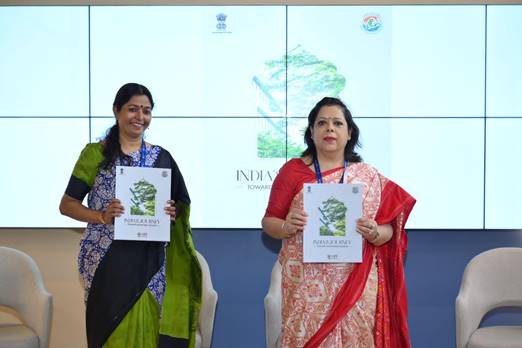New Delhi: Secretary of the Ministry of Environment, Forest and Climate Change, Leena Nandan has today said that India will proactively lead the way in achieving all its climate targets.
Speaking at a side event on “India’s journey towards sustainable cooling” at the India Pavilion, on the sidelines of the UNFCCC COP 28 in Dubai, she said that nothing is a better display of this resolve than India’s current status in terms of Nationally Determined Contributions.
Elaborating this she said “when India had announced NDCs in 2015 we envisaged 33-35% emission intensity reduction by 2030, but we have pushed its efforts in a big way.
While India has continued to grow, it has also progressively decoupled emissions from economic growth and this has resulted in achievement of 33% reduction in emission intensity of GDP in 2019 itself.” The Secretary credited this success to a parallel push India has given to renewable energy for its requirements.
Ms Nandan went on to add that India, however, does not sit back on its laurels. “We have gone on to scale up our climate ambitions. The NDCs updated last year reflect our concern that we indeed as a global fraternity need to do much more to tackle climate change.” she added.
“India has not been part of the problem but is facing the consequences of climate change, and yet India has stepped up to play a leading part in the solution. This is effectively demonstrated in India’s approach of balance between economy and ecology, development and environment.
“The India Cooling Action Plan has become a model for many countries. Going forward, we need to bolster our efforts and be at the forefront of change, and research on coolants that would be most appropriate to Indian climatic conditions.” This research, she added, should be matched with the dialogue with industry to cause quick off-take and scaling up of this technology.
Underlining that India will set the narrative on how to grow responsibly and sustainably. The Secretary underscored that Government of India is committed to implementing path breaking solutions. She invited the industry and other stakeholders to make India a leader in aspects of cooling.
The event at the pavilion showcased India’s success in achieving targets under the Montreal Protocol and its roadmap towards creating a sustainable cooling and thermal comfort ecosystem, which has become a necessity for environmental sustainability.
Rajasree Ray, Economic Adviser, MoEFCC, underscored the importance of an integrated approach for achieving sustainable cooling and thermal comfort in India.
During the side event, a publication on “India’s journey towards sustainable cooling”, was released which provides an insight into various initiatives taken by the country including synergies with international environmental commitments.


